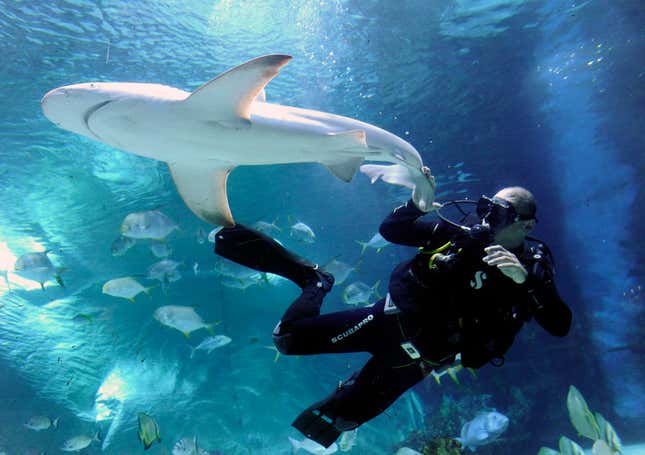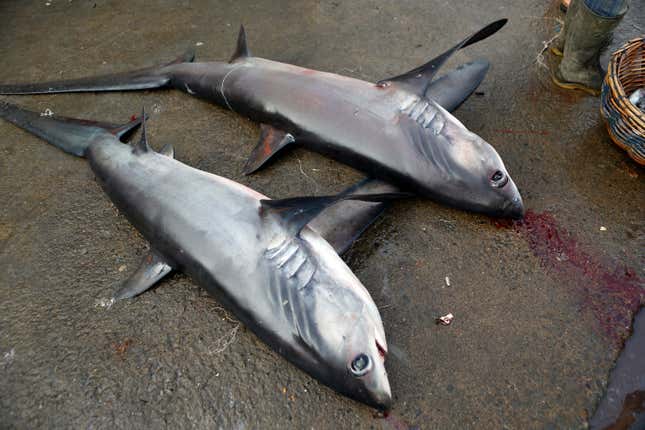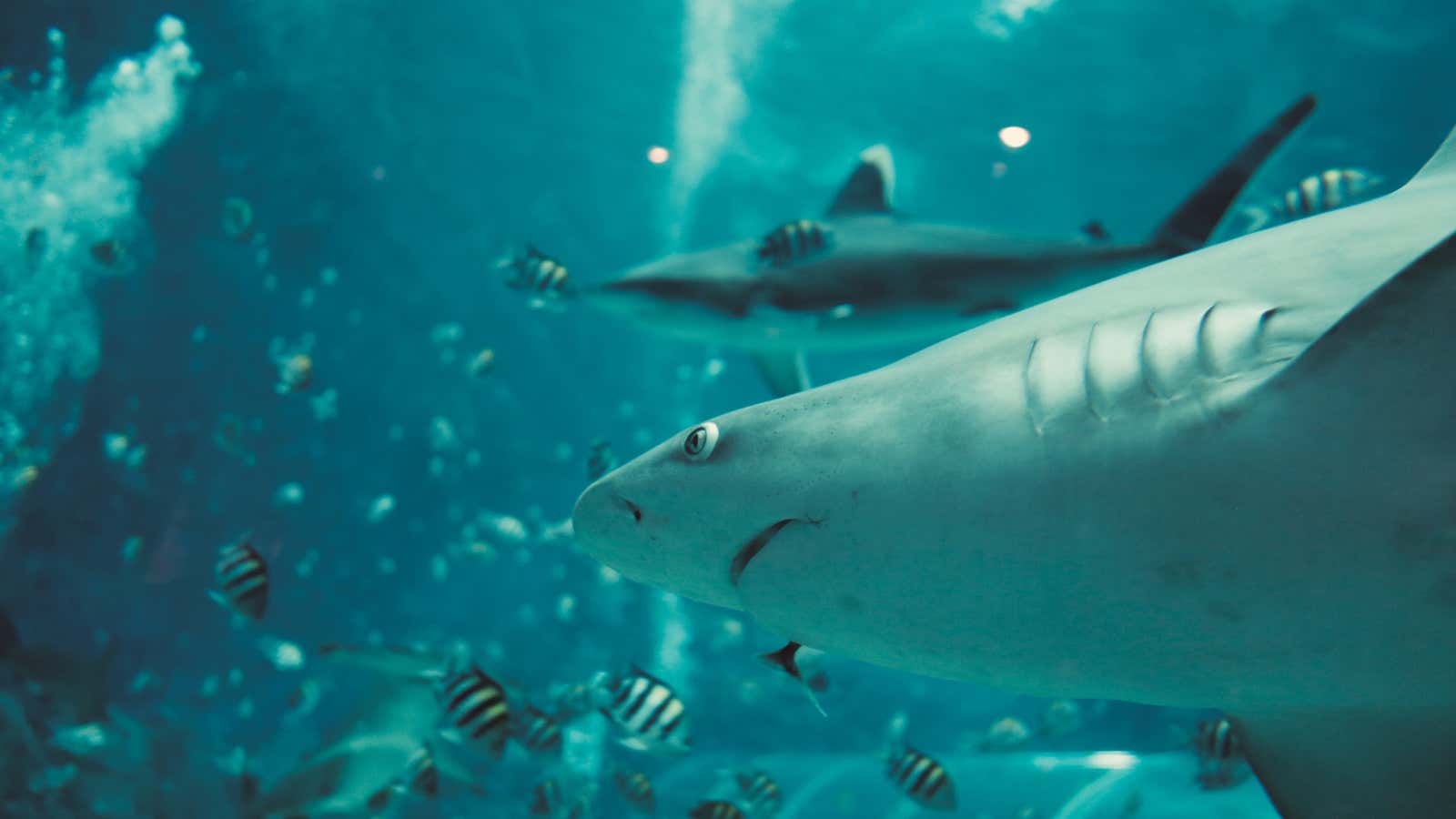People have all kinds of weird fears that aren’t really rational. Most famously perhaps, is how absolutely terrifying we find sharks. We’re way more scared of them than cars, though they rarely kill anyone—just five people worldwide in 2017—while cars are fatally dangerous and take 1.3 million lives internationally annually. Yet there are few blockbuster films about vicious vehicles, while terrifying shark movies are a common summer phenomenon, from 1975’s Jaws to this summer’s Meg, starring Jason Statham battling a 75-foot-long nightmarish “prehistoric” shark.
If you’re smart, you’ll start appreciating sharks, no matter what Hollywood says. We need them for many reasons, not least because these apex predators police the ocean, maintaining an important balance in marine ecosystems. Not only do they eat strategically, keeping prey populations healthy by choosing to dine on the easiest catch—the sick and weak—they also intimidate other creatures, which maintains ocean habitats.
For example, scientists in Hawaii contend that when tiger shark populations dwindled, turtles took to eating all the most nutritious sea grass, which led to the destruction of seabed ecosystems. Between 1959 and 1976, that state culled nearly 5,000 sharks in an effort to make the waters safer for humans, but this seemed to make little difference in the rate of annual shark attacks, according to University of Hawaii marine biologists who now track and research the creatures’ activities. On the other hand, the shark culling did affect the health and balance of marine ecosystems.

Humans also rely on sharks to survive, albeit indirectly. We depend on the oceans to produce oxygen and to keep the air we need to breathe clean. Oceans remove half of the world’s greenhouse gases—more than rainforests—and they control the planet’s weather and temperature. Sharks maintain the natural balance in the ocean, which in turn protects us.
A 2016 theoretical study, published in Ecological Informatics, posits that marine ecosystems that are overfished and have few sharks contribute to increased carbon dioxide production in the ocean, hastening climate change, in addition to leading to the collapse of natural balance and a cascade of negative effects.
The oceans also provide about a third of the world’s food supply. Every year 200 billion pounds of fish and shellfish—and yes, sharks—are captured for human consumption. When we’re not eating them, however, sharks help keep the seas healthy, and their disappearance leads to the collapse of fisheries that we rely on for our own food supply.
Sharks are not as interested in meeting or eating us as we are in them and their territory. Last year, there were 155 human-shark interactions world-wide, according to the International Shark Attack File. Of these, 88 were confirmed as unprovoked shark attacks, 30 were provoked, 18 involved boats, 12 may not even have been sharks at all, and the rest can’t be confirmed. These figures include divers, fishermen, surfers, and all the bathers who take to the world’s waters.
“The number of human-shark interactions is directly correlated with time spent by humans in the sea,” the ISAF website explains. As human populations grow and aquatic recreation becomes more popular, these interactions increase. Still, the sharks aren’t out to get us—we’re just increasingly showing up in their spaces and coming face-to-jaw with the ocean’s police.

Sharks are our evolutionary elders, which is another reason to respect them. They have been around for a very long time, about 400 million years. They swam the oceans before before dinosaurs roamed the Earth and managed to survive the formidable landlubbers. In contrast, humans have only existed for about 300,000 years, or at most 500,000 years.
The reason for the apex predator’s longevity is that it’s incredibly well designed, internally and externally. Understanding the shark can help solve human problems. Sharks heal exceptionally quickly from wounds and are resistant to infections and to diseases. Scientists are sequencing their genome to try to isolate why this is and how it might be replicated in human medicine.
One burn treatment, called Omnigraft Dermal Regeneration Matrix, uses shark cartilage, for example. Shark genes could also provide clues for cancer cures—a 2017 study found that sharks have evolved cancer-resistant genes; the human counterparts of these genes, when over-expressed, make people susceptible to cancer.
Meanwhile, the company Sharklet Technologies is experimenting with shark skin-inspired surfaces to reduce infections and contamination at hospitals, inspired by the way the rough texture of the sea creature’s epidermis deters organisms. Copying shark skin micropatterns and using them to treat surfaces in a hospital setting contaminated with Staphylococcus aureus reduced transmission of this infectious bacteria by 97% compared to copper, a common antimicrobial surface, Pharmacy Times reports.

Although we love to hate sharks, people also like to bite their style. In 1961, sharks inspired the design for General Motor’s 1961 Chevrolet Corvette Mako Shark concept car. This car came to be after the company’s head of styling and design, Bill Mitchell, returned with a mako shark from a fishing trip and was so smitten with his catch he had it mounted in his office and ordered a car designed in its image. The car never went to market but it gained “iconic status,” General Motors Heritage Center manager Greg Wallace told CNN in 2013.
Shark skins also surface in athletic design, inspiring Speedo’s Fastskin II swimsuits which were said to reduce the drag on swimmers, an innovation that made waves during the 2008 Olympics. This claim was debunked by George Lauder, a Harvard ichthyologist—that is a specialist in marine zoology— in 2012. He said that sharks might have inspired the suits but they didn’t really reduce drag as efficiently as the magical epidermis of the magnificent shark.
Try though we may to copy sharks, it’s hard for humans to replicate the nuances of the design that’s withstood the very long test of time—and maybe that’s sufficient evidence we shouldn’t mess with them and should respect these mysterious creatures. Who even knows what they’re up to, really? Their strange ways confuse researchers, too—great white sharks have in the past decade taken to congregating annually in the Pacific, for example, and no one knows why.
Still, if all that’s not enough to convince you sharks don’t deserve their bad reputation, here’s another reason you may not want to be on the side of the haters. According to Stormy Daniels, the adult film star who alleges she had an affair with US president Donald Trump in the past, he can’t stand these apex predators and wants them all dead. Perhaps it’s tough for some of us to admit when another creature is superior—don’t be that guy.
This article is part of Quartz Ideas, our home for bold arguments and big thinkers.
